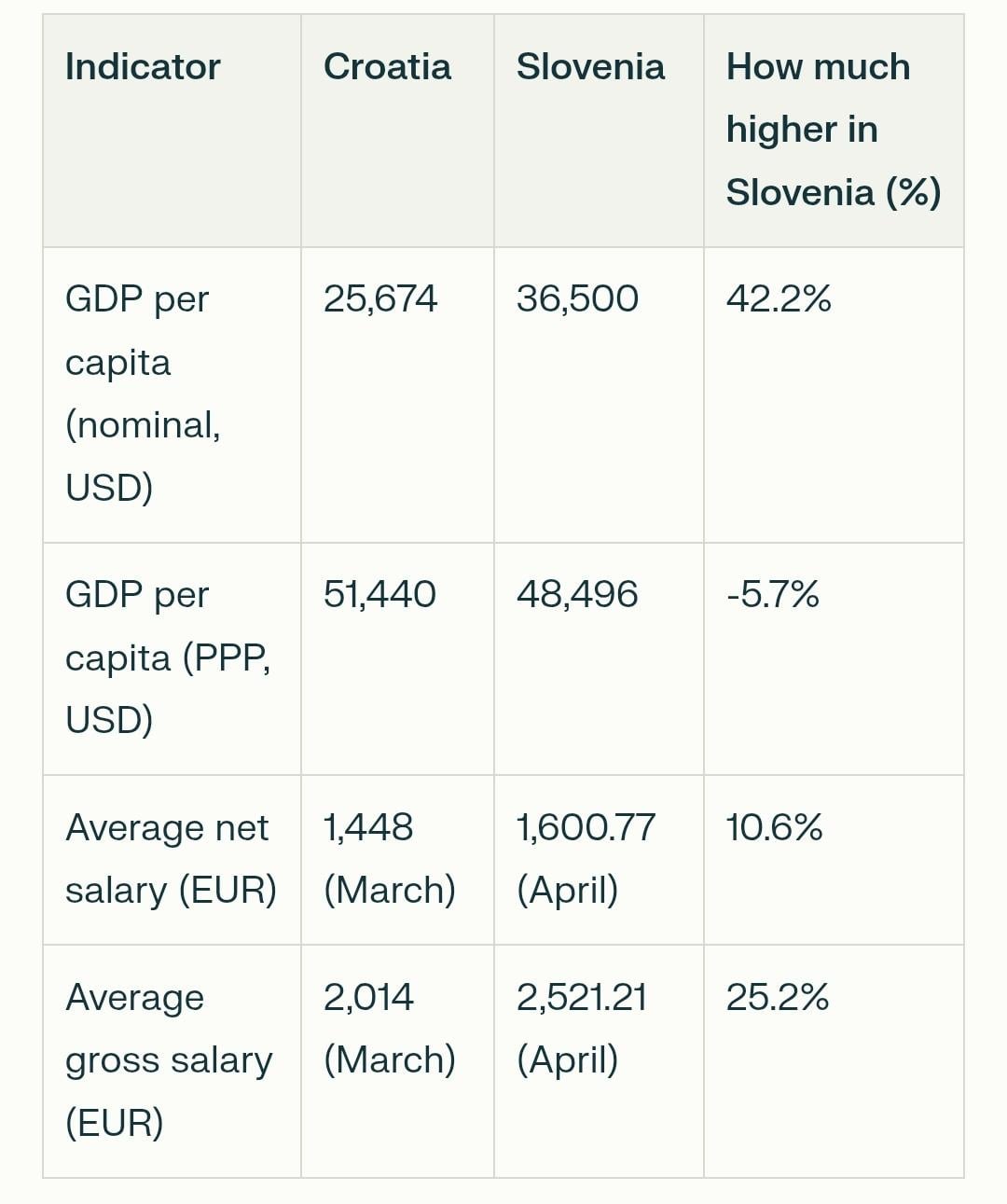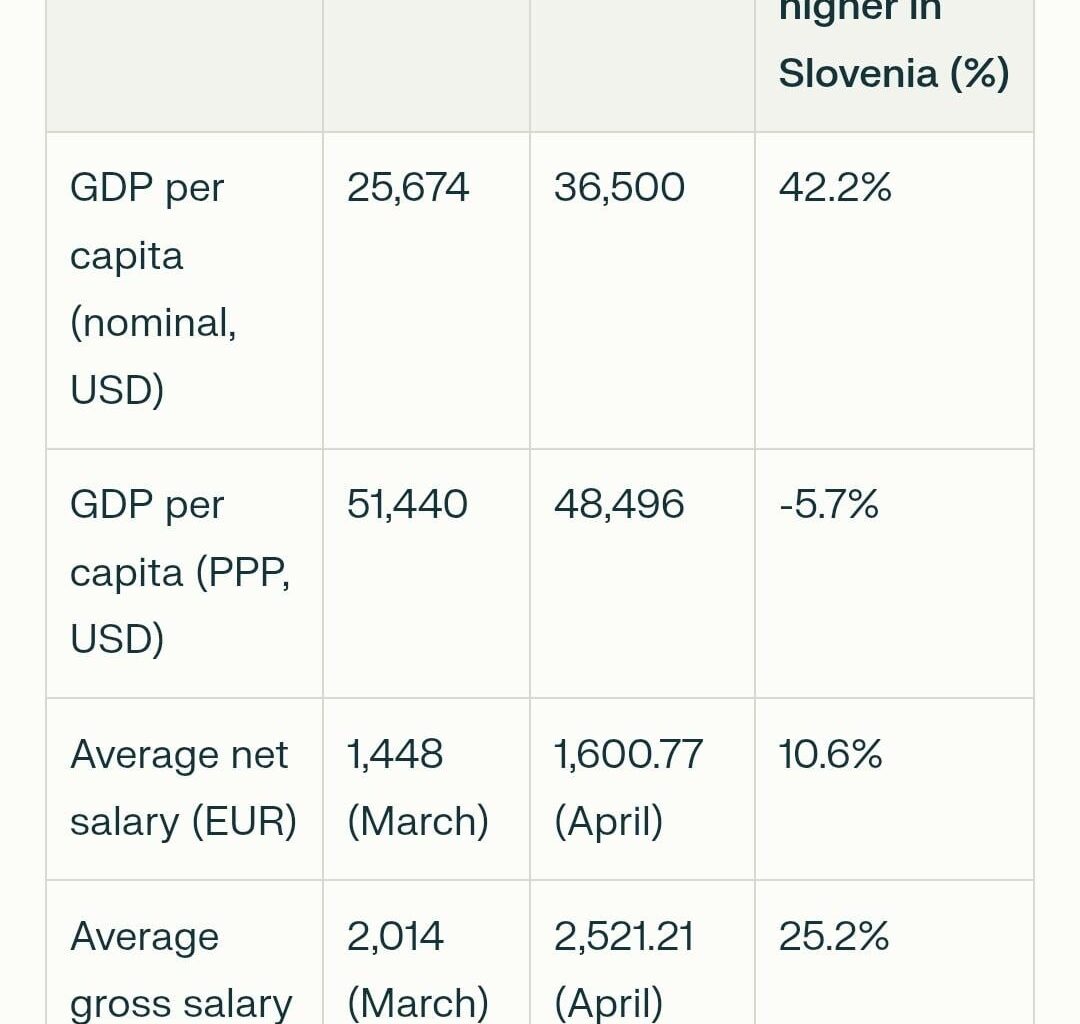
Hey,
I am looking at this stats and I am trying to understand why Slovenia has so much higher GDP per capita but difference in salaries are not that big. What do you think are the main reasons for this and how do you believe these differences impact the everyday lives of people in both countries?
by Dry-Statistician3712

15 comments
Because Slovenia is governed by the far left which taxes everyone making few € above minimum wage to the death.
Impact ? Well there are 200k foreign workers in Slovenia, 95% working for minimum wage, 95% from outside of EU. People emigrate and in general the whole region is getting severely battered, there are 4-5 million of people less living in Former Yugoslavian republics right now than in 1990 (and that is counting Albanians, Filipinos, people from Nepal in Croatia, etc).
slovenians are more productive, while croats live off overcharging us as when we go there as tourists in summer
From what I see you have good data, nominal for slovenia is 35k for 2025, but ppp per capita is way off.
So if you are taking the 2025 projections it is 57,9k in ppp per capita.
Main problem in terms of monthly salaries is that slovenia has a bunch of non or semi taxed parts of the salary and those are never included in avarage gross or net. Also both croatian and slovenia have sth on top of vruto, in case of slovenia its named bruto bruto(around 16%+ on top of bruto) and for croatia bruto2, not sure what extra amount they have for the employers.
It was estimated around 370€ per month in a net amount for 2023 on top of the average net. This is coming from transportation, lunch and regres. All these are mandatory for every employee.
If you check some anual wage or hourly wage expenses for employers you will see that slovenia has it significantly higher than croatia. Slovenia just sucks ass in avarage net. Also in slovenia gini is extremely low, meaning that most people get close to the avarage. Median was around 200euros net less than the avarage last year.
We have to look at this difference also from a statistical point of view. In Slovenia, you need to take into the account also the bonuses which are added to the neto salary, such as bonus for work lunch (7,95 eur/day) and bonus for driving to work (0,21/km). Those two are tax free. Since the taxes on our salaries are high, a lot of companies try to optimize the salary in way, they pay a lot of your salary in those bonuses which dont count in the statistical neto salary. I believe in Croatia (as in almost all european countries) you dont get any additional bonuses on a neto salary. So a lot of people can get up to 500 eur in bonuses and it kind of messes up with the statistics.
Croatia had 5 years of war in the 90s, it took a massive effort to rebuild, stop the corruption that comes with war times, heal psychologicaly, pay injured war veterans, whereas Slovenian ‘war’ for independence lasted less than a month with practically zero casualties and damaged infrastructure.
Croatia has HDZ which destroys the will to try to do anything
Where did u get data from GDP PPP??!? Link pls …
It stems from culture and history. Croatia was between 1500 and 1900 much more exposed to Ottoman invasions and incursions and was a much less secure place to develop and maintain a less corrupt civil structure and various industries, and until recently (historically speaking) a large part of the country was a ‘military frontier’. That’s one of the reasons Slovenia has more big industrial companies, even in smaller towns like Novo Mesto. Also, Slovenia was a part of Austria for a long time, while Croatia was a part of Hungary (which was also less stable), and you can see a similar state between Czechia and Slovakia, too.
(The war in the 90s too is more of a symptom of this and not a cause of the difference today)
Notice there’s quite huge difference in GDP while in net payment not so much – why?
Capital gains, rents, and interest in Slovenia are not included in income tax, meaning they are not taxed progressively. The tax on capital gains even decreases with the length of holding. Because of this, too little revenue is collected from these sources, and wages of workers are more heavily taxed compared to, for example, Croatia.
This is what job-creator lobby pulled off under right wing government rule 20+ years ago and hasn’t been fixed by now nevertheless OECD reports advised so. [https://www.oecd.org/en/publications/oecd-tax-policy-reviews-slovenia-2018_9789264303898-en.html](https://www.oecd.org/en/publications/oecd-tax-policy-reviews-slovenia-2018_9789264303898-en.html)
However, it must also be acknowledged that quite a portion of workers’ income is untaxed and not recorded under gross salary — such as meal allowances, transportation, and holiday bonuses.
Because it is more developed in terms of economy. Why does Chile have higher GDP per Capita compared to Brazil…?
The real question is why does Croatia has almost the same net salaries when services of the state are about the same level, both shit.
Very good point op. We are all wondering the same.
What would happen if you put this question in chat gpt
It’s easy to explain. Slovenians are now harder to exploit, so with that everything grew. But growth does not mean happiness. Because prices grew too.
But now companies “are moving” to Croatia now (that was they say) because lower numbers in GDP mean that we see here are good for them. Because lower the number more corrupt is the country and easier to control.
But economy will grow and so will the minimal standard and Croatia will catch up. And then companies will move to? Serbia? Bosnia?
Idk. This is just my explanation of what I see.
There are many reasons, but here is one example. There is a Renault car factory in Slovenia. It increases GDP a lot, but the only benefit is the salary of the workers, and the profit leaves Slovenia. Croatia does not have such companies. Also, if you look at the salaries for December in Slovenia and Croatia, you will see how much higher the salary was in Slovenia. The reason is that in Croatia, the 13th salary does not count towards the average, while in Slovenia it does. Although both countries have higher salaries in reality, because many non-taxable supplements do not count towards the salary (regress, Christmas bonus, employee bonus…)
Now check the official data for median disposable (net) income (in Slovenia is around 50% higher than in Croatia): https://ec.europa.eu/eurostat/databrowser/view/ilc_di03/default/table?lang=en
Comments are closed.